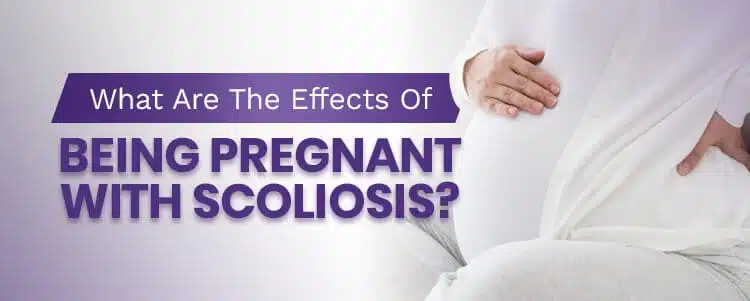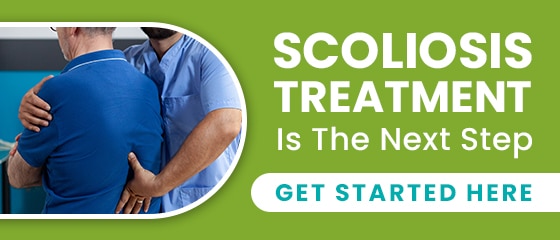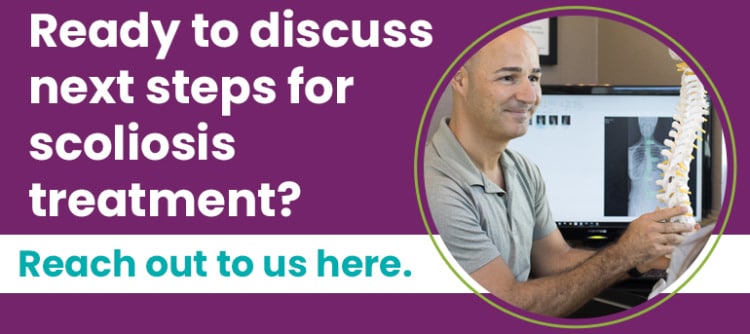While there is no evidence to suggest that scoliosis affects the outcome of a pregnancy, it can cause additional back pain. In extreme cases, scoliosis can cause some additional challenges during pregnancy and labor; in general, women with scoliosis are just as capable of delivering healthy babies as average women.
Getting Pregnant with Scoliosis
When a person or loved one is diagnosed with a progressive condition like scoliosis, many of the first questions asked involve what living with the condition will be like. Patients wonder how much it will change their lives and if they will be able to still do the things they love.
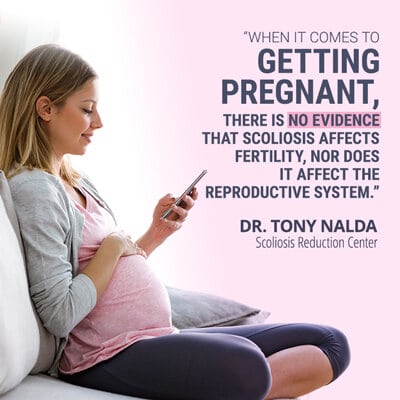
Caregivers often ask how it will affect the future of their loved ones. They want to know how much worse the condition can get, what physical activities might have to be given up, how much time is spent on treatment, and for females, it’s natural to wonder about pregnancy.
When it comes to getting pregnant, there is no evidence that scoliosis affects fertility, nor does it affect the reproductive system in any way. While severe cases of scoliosis can cause lung impairment, headaches, pain in the back and legs, and digestive issues, difficulties getting pregnant is not on the list of possible scoliosis-related complications.
Back Pain in Pregnancy
When a patient with scoliosis is pregnant, there aren’t a whole lot of extra challenges I have to prepare them for; the most common complaint I hear from my pregnant patients is that the back pain can increase.
That being said, it’s not a given that being pregnant with scoliosis is bound to be extra painful; this will depend largely on the severity of the condition and varies from case to case.
Just as the average pregnancy of a healthy individual with no medical conditions causes a certain amount of pain and discomfort, that’s no different for my patients. Back pain in healthy pregnancies varies from woman to woman, and the same can be said for my scoliosis patients.
I’ve had some patients say they don’t notice an increase in scoliosis-related pain, while others say that the back pain intensifies throughout the pregnancy and labor.
In general, a woman with scoliosis is at a higher risk for lower back pain, but in most pregnancies, scoliosis or not, lower back pain is a factor.
Labor and Scoliosis
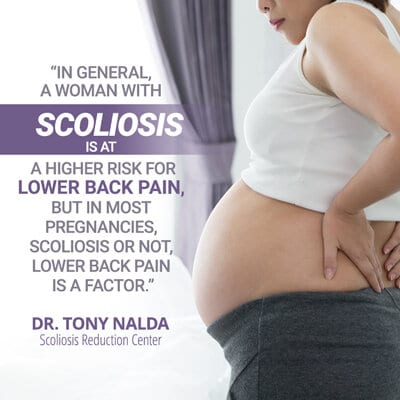
Naturally, women want to know if their scoliosis can lead to complications during labor. In the past, doctors would sometimes assume complications would occur in delivery and automatically scheduled C-sections for women with scoliosis.
Fortunately, in this day and age, we are more educated on the condition and know that’s not necessarily the case; plus, unnecessary surgery is never a good idea.
As more women with scoliosis educate themselves and opt for vaginal deliveries, it becomes clear that they can deliver healthy babies without any additional scoliosis-related complications.
Although most deliveries are uncomplicated, there are some potential differences that can emerge. For women whose scoliosis has caused crooked hips, there can be an increased number of stalls during labor as the baby can end up malpositioned.
For cases of scoliosis where the spinal curvatures are extreme, potential additional complications include intense back pain and difficulty breathing due to lung impairment.
Getting an Epidural with Scoliosis
When it comes to pain relief for women with scoliosis during labor, the conventional methods and medications still apply and are effective. One pain-relief method that is affected by scoliosis is the mighty epidural.
Epidurals are done by anesthesiologists and involve getting an injection into a specific area of the spinal cord. If a patient has scoliosis, they need to make sure the anesthesiologist is aware and has an X-ray so they can see where the curvature is located along the spine.
If they know precisely where the curvature is and how severe it is, they can still safely administer the epidural and ensure the injection gets into the space around the dura mater of the spinal cord, where it needs to go.
Epidurals that are not delivered correctly or that don’t make it into the right area of the spinal cord carry risks of paralysis and other complications such as inadequate freezing, blood pressure issues, and difficulty breathing.
Getting an Epidural After Spinal-Fusion Surgery
Women who have had spinal fusion surgery for their scoliosis also have to approach epidurals cautiously and ensure the anesthesiologist knows about their condition and has a current X-ray to refer to.
The danger of giving epidurals to women who’ve had spinal-fusion surgery revolves around inserting a needle into an area with a lot of surgical hardware.
Pregnant patients will need to discuss their pain-management options with their doctor prior to delivery so everyone is on the same page, and all relevant parties know the extent of the patient’s condition.
Pregnancy and Progression
A lot of women are concerned with how their pregnancy will affect progression. For patients who have been working hard to slow or stop their condition’s progression, this is a real concern as no one wants to slide backward or have their hard work wasted.
Research has shown that weight gain from pregnancy doesn’t make a spinal curvature progress, as long as the curve has already stopped progressing. For women who have undergone treatment and achieved a reduction, there is little cause for concern that the pregnancy will undo that result.
While many people question how pregnancy doesn’t increase scoliosis progression, one common theory involves the body’s release of the hormone ‘relaxin’. For all pregnant women, whether they have scoliosis or not, this hormone helps prepare the body for labor by relaxing the ligaments in the pelvis; it’s been suggested that this hormone can also relax the spine, allowing the extra stress of pregnancy-related weight gain on the spine to occur without worsening the curvature.
Pregnancy and Treatment
When it comes to treating pregnant patients, my treatment plans don’t change all that much. I take into account the extra strain that pregnancy adds on the body and adjust the plan accordingly, but my functional scoliosis-specific chiropractic approach will still work towards stopping or slowing progression throughout the pregnancy.
One aspect of treatment that changes slightly with my pregnant patients is how I monitor that progression.
While X-rays are the gold standard for monitoring spinal curvatures, for pregnant patients, we like to limit their exposure to X-rays. For the duration of the pregnancy, I would continue to monitor their progression but would rely on visual assessments, rather than X-rays.
Is Scoliosis Hereditary?
Many women with scoliosis are unsure if they should even get pregnant; they worry they can pass along the condition to their child. This is a natural and understandable concern for any parent.
The quick answer is that there is no specific gene that is responsible for scoliosis. In fact, 80 percent of known diagnosed scoliosis cases have no known single cause. By extension, there is no genetic testing that can be done to tell people if they will develop the condition or not.
Twin studies support the view that scoliosis isn’t hereditary as some have shown one twin developing the condition, while the other doesn’t, or twins developing wildly different curvatures at different locations along the spine.
While a genetic predisposition can come into play with more than one person in a family developing the condition, this is not due to a specific gene or genetic mutation; it’s more commonly understood as the result of other shared factors such as lifestyle, socioeconomic factors, environmental factors, posture, and even common reactions to stress.
Conclusion
When any woman gets pregnant, there are risks involved. From nausea to back pain and weight gain, every pregnancy is as different as the babies being carried. For women with scoliosis, the fears surrounding pregnancy and labor can cause added stress and concern.
In severe scoliosis cases, the likelihood of experiencing increased rates of back pain, possible stalls during labor, and breathing difficulties are higher. In addition, when it comes to pain management during labor, epidurals have to be performed with extra caution; I always suggest making a recent X-ray available to the anesthesiologist before the epidural is discussed or performed to ensure the injection enters where it’s supposed to.
In general, women with scoliosis experience their pregnancies like average women, with some reporting more scoliosis-related back pain than others. Women with scoliosis deliver healthy babies all the time, and there is no reason for them to fear pregnancy and labor complications any more than average women do.
My pregnant patients are monitored closely to ensure their scoliosis-specific physical therapy is aligned with any additional limitations their pregnancy is placing on them. Here at the Scoliosis Reduction Center®, each and every treatment plan is 100-percent customized to each individual patient, and this approach is ideal for pregnant patients wanting to continue moving forward with their treatment and have a safe and healthy pregnancy and delivery.

